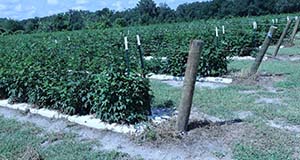Abstract
Blackberry (Rubus spp.) is a deciduous fruit crop. The fruit are usually small, round, and dark purple to black. Blackberry fruit is comprised of multiple drupelets that cluster together to form a berry, which has a glossy appearance when matured. Blackberries have a complex flavor profile that blends sweetness and acidity, and taste may vary depending on the variety and maturity stage. They are rich in nutrients, vitamins, minerals, and antioxidants. Blackberries are best grown in sub-tropical to temperate climates. Blackberry is a new emerging fruit crop in Florida, where they are harvested in May-June. There are several varieties, some of which are native to Florida. This publication aims to provide a general overview of the importance of trellis, different types of trellis, and their installation in blackberry production for county and state Extension faculty, growers, homeowners, and students interested in growing blackberries in Florida.
References
Andersen, P. C. 2020. “The Blackberry.” HS807. Gainesville: University of Florida Institute of Food and Agricultural Sciences. https://edis.ifas.ufl.edu/publication/HS104
Poling, E. B. 1997. “Blackberries.” Journal of Small Fruit & Viticulture 4 (1–2): 33–69. https://doi.org/10.1300/J065v04n01_02
Strik, B. C., and C. E. Finn. 2012. “Blackberry Production Systems- A Worldwide Perspective.” Acta Horticulturae 946: 341–347. https://doi.org/10.17660/ActaHortic.2012.946.56
Takeda, F., D. M. Glenn, and T. Tworkoski. 2013. “Rotating Cross-arm Trellis Technology for Blackberry Production.” Journal of Berry Research 3(1): 25–40. https://doi.org/10.3233/JBR-130044
Stiles, H. D. 1995. “Blackberry Trellises.” HortScience 30(3): 430f–431. https://doi.org/10.21273/HORTSCI.30.3.430f

This work is licensed under a Creative Commons Attribution-NonCommercial-NoDerivatives 4.0 International License.
Copyright (c) 2024 UF/IFAS

